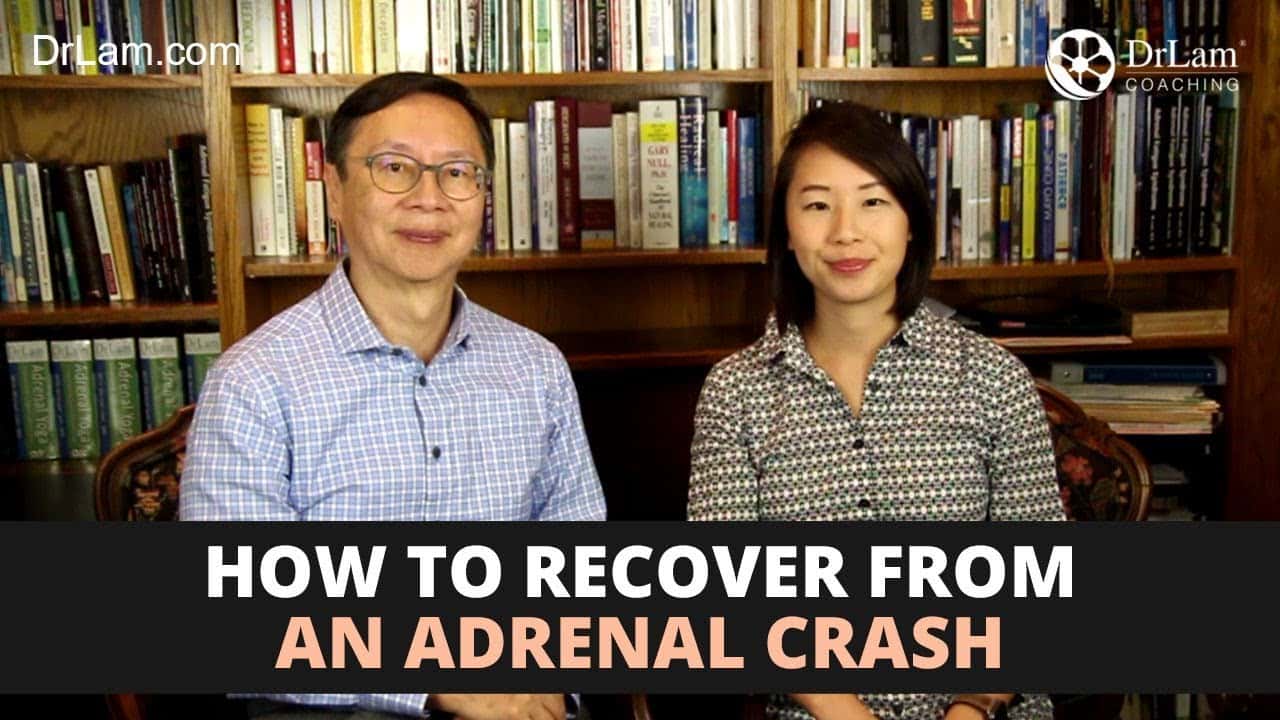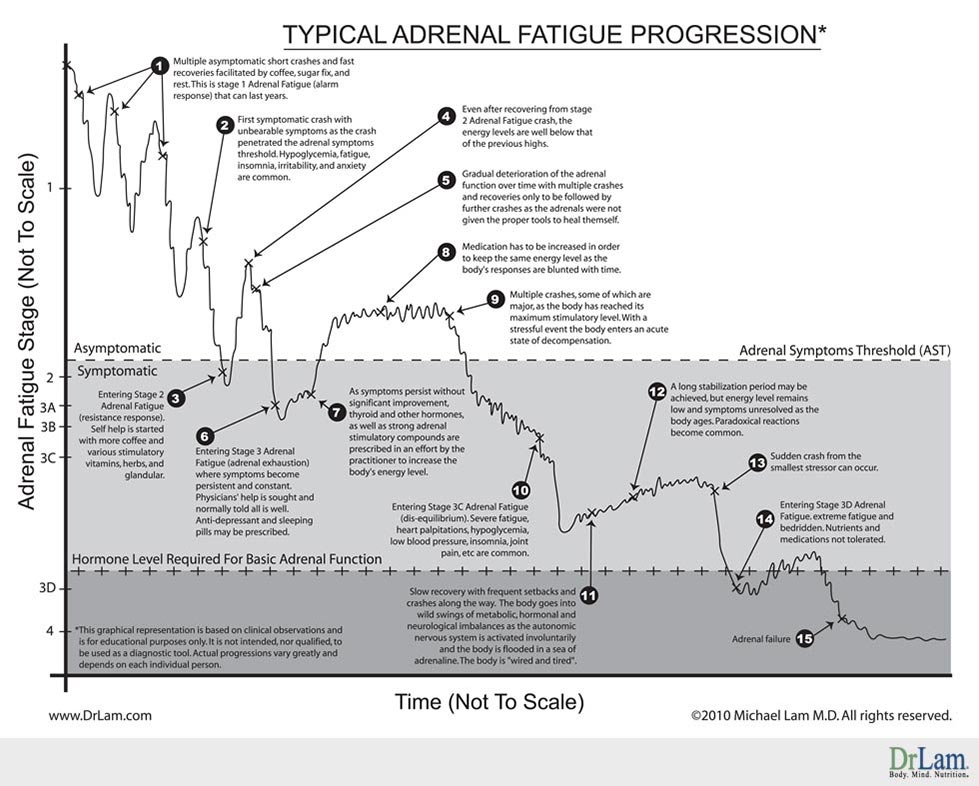
If you’ve been tired to the point of being unable to function normally, you may have adrenal fatigue. And if your fatigue is severe enough to force you into bed rest, you may be suffering from an adrenal fatigue crash. In this article, we’ll get into what adrenal crashes are and how to avoid the adrenal fatigue crash and recovery cycle. Many people in our program have been there. You are not alone! But first, you need to know if your condition really is adrenal fatigue or if it’s something else.
» Read our complete long-read article on Adrenal Fatigue crash and recovery cycle
» Adrenal Fatigue FAQs
» Take our 3-minute test to see if you may have Adrenal Fatigue
Adrenal Fatigue Syndrome (AFS) is a common condition that is the result of facing chronic stress, whether physical or psychological. It happens when your adrenal glands dysregulate due to the pressure they’re under to produce enough cortisol, your body’s main anti-stress hormone.
Symptoms of AFS include fatigue, insomnia, weight gain, brain fog, anxiety, mild depression, frequent colds and flu, low libido, PMS, infertility, hypoglycemia, salt and sugar cravings, an inability to handle stress, trembling, lightheadedness, heart palpitations, hair loss, and dry skin.
There are no tests that can determine whether or not you have AFS for sure, and many mainstream medical practitioners do not yet recognize the condition. So most sufferers discover it by doing their own research and determine they have it by a process of elimination. Someone experienced in identifying this condition can help you with your recovery process.
AFS can sometimes look similar to depression, thyroid issues, and chronic fatigue syndrome. And in many cases, you can have more than one of these conditions at the same time. So it’s important that you are well-informed about your condition and the types of recovery tools available before embarking on your recovery journey. The main reason for that is that you want to avoid the debilitating adrenal fatigue crash and recovery cycle. Our nutritional program is a good place to start! With our coaching clients, we make it a point of going through their diet and making suggestions that will help kick-start their recovery process.
 Your adrenal glands are your NeuroEndoMetabolic (NEM) Stress Response’s first line of defense against stress. They are part of its Hormone circuit, along with the thyroid and reproductive organs. The other five circuits of the NEM are the Bioenergetics, the Cardionomic, the Neuroaffect, the Inflammation, and the Detoxification circuits.
Your adrenal glands are your NeuroEndoMetabolic (NEM) Stress Response’s first line of defense against stress. They are part of its Hormone circuit, along with the thyroid and reproductive organs. The other five circuits of the NEM are the Bioenergetics, the Cardionomic, the Neuroaffect, the Inflammation, and the Detoxification circuits.
When your body faces chronic stress, your adrenal glands have to keep increasing their output of anti-stress hormones. The more they overwork, the more dysregulated they become. Because they are intimately connected to the other Hormone circuit components, they affect the thyroid and reproductive hormones, as well as all other hormone systems in the body. That’s why symptoms of AFS can be so varied. If your healthcare practitioner has unsuccessfully explored all possibilities for your condition, adrenal fatigue may be the cause.
Your body then tries to compensate for these imbalances and loss of energy by slowing down physiological functions, especially those not necessary for survival. This helps you conserve energy, but it can also force you into bed rest. That is what we call an adrenal fatigue crash. Your body shuts down and its main focus is on energy conservation, leaving you unable to function normally.
Once this compensatory response reaches its goal, the crash is over and you can slowly return to a functioning state. However, if you don’t address the stress and AFS, another crash is inevitable. That’s how the vicious adrenal fatigue crash and recovery cycle continues, robbing you of your health and quality of life.
The big risk is that unless this cycle is addressed in the proper way, it will eventually lead to adrenal failure, which is a very dangerous state. Adrenal failure can result in a cardiovascular emergency and even death. That’s why getting the right kind of support is so important.
The adrenal fatigue crash and recovery cycle is made up of two phases: a crash and then recovery. The Crash Phase is marked by a sharp decrease in energy, with the main symptom being fatigue. The Recovery Phase is marked by a gradual return of bodily functions and energy. This long process may be helped along by means of proper nutrition and other solutions, as we describe in the Dr. Lam Coaching program.
Each of the two phases has its own set of signs and/or symptoms that can differ from person to person. But the general trend will look like the below illustration.
When you go into an adrenal fatigue crash, the first thing you’ll notice is that you’re tired. The severity of your fatigue is what determines how bad this crash is since you can’t test for an adrenal fatigue crash. For most people, the first few crashes are mild and easy to recover from quickly. But with each subsequent crash, recovery is more difficult and takes longer.
The reason for this is that each crash incurs some physiological damage. When the underlying cause of the crash is not addressed, it continues to worsen. This brings on more crashes, each one more severe. The result is a downward spiral that continues to drain you unless the underlying problem is resolved.
Symptoms of an adrenal fatigue crash are similar to those of AFS, such as fatigue, brain fog, mood changes, hypoglycemia, and poor digestion. The difference is that these symptoms come on more intensely during the Crash Phase, and get better after the Recovery Phase. Other symptoms of a crash include adrenaline rushes, muscle weakness, water retention, sugar cravings, bloating, hot flashes, joint pain, fibromyalgia, cold sweats, heart palpitations, and flare-ups of chronic conditions.
An adrenal fatigue crash is triggered by a physical or emotional trigger. And depending on how advanced your condition is, the trigger could be extreme or quite mild.
For example, if you’re still in good shape and you haven’t had a crash yet, your first could come after something very stressful happens, like losing your job or getting a strong infection. But if your condition is advanced and your body is weak, something as simple as staying a little too long at work could bring on the next crash.
If you’re not actively pursuing recovery, the Recovery Phase of the adrenal fatigue crash and recovery cycle will be an automatic one. Unlike the Crash Phase, which can be sudden, the Recovery Phase is gradual. After putting into place the mechanisms to conserve energy, your body's energy levels will slowly increase. Physiological functions will also slowly come back.
In the beginning stages of AFS, recovery can return you to a normal or near-normal state. You’ll have a crash where you’re tired and bedridden for a day or two, but then you’ll get back to your daily routine right after.
But if you’ve been suffering from AFS for a while and you’ve had frequent crashes, the Recovery Phase will be slower. It is also unlikely that you’ll go back to a pre-crash state, as each crash weakens you further.
After the crash, the first part of recovery is called the Stabilization Period. This is where the crash has stopped and there is no further decompensation. Your body is operating in a state of low functioning, but it’s not getting worse.
Next is the Preparation Period. This period lasts between one day and six weeks, and it’s where your body is rebuilding its energy and nutrient stores. If you’re following a recovery plan, your health practitioner will focus on giving you gentle nutrients to help with this. You’ll start to see gradual improvements now.
After the body has prepared itself, it will get to the Honeymoon Period. Depending on whether or not you are following a recovery plan, this period can last anywhere from a few days to three months. This is when you’ll see some significant symptom relief and increases in energy levels. You might still experience mini-crashes and recoveries during this period, but they’ll be quite short-lived.
Finally, once the Honeymoon Phase is over, you will reach the Plateau Period. Your body is now stabilized, even if it’s not back to a pre-crash level. This period can last weeks, months, or even years. But if you’re not addressing your AFS, you will most likely end up having another crash and recovery cycle. This can be really frustrating, and most people get stuck in this loop unless they find the right recovery program for them.
As you know by now, the intensity and length of an adrenal fatigue crash depends on your current state of health. If you’re in the earlier stages of AFS, a crash might be so mild that you don’t even notice it. But if you’re in the more advanced stages, you can go into a major crash from a minor trigger.

This is why it’s important to really take the time to analyze and understand your condition – from the stage of adrenal fatigue you’re in, to the types of triggers that set off your crashes.
In stage one of adrenal fatigue, called the Alarm Reaction, you probably won’t notice a lot of symptoms, if at all. You might have a minor crash and not even know it. Fatigue can keep you from reaching peak performance, but otherwise, you function normally.
Stage two, called the Resistance Response, is more symptomatic. Crashes become more noticeable and more common. You get more frequent fatigue, and you might have a harder time functioning normally.
Stage three, called Adrenal Exhaustion, is where you really start to see the symptoms of AFS clearly. You’ll experience minor crashes every few weeks, and major crashes every six months to a year. During these crashes, the AFS symptoms you have worsen, and they don’t disappear after the Recovery Phase.
Stage four, called Adrenal Failure, is where you’re so weak and your AFS is so severe that you can barely function. You’re bedridden and your crashes are almost constant. This is a very challenging state to be in, and it is nearly impossible to recover from it without the help of a very experienced health professional. A wrong move in recovery can cause paradoxical reactions and make you even weaker.
For most sufferers of AFS, experiencing a crash is inevitable. That’s why learning how to manage crashes is a good idea, even if you’ve already started on a recovery plan.
The first thing to remember is to keep the long-view. Adrenal fatigue develops over months and even years before the symptoms are bad enough to be noticed. Likewise, it will also take some time to recover. During that time, you will experience crashes and you will recover from them. So don’t be afraid of them.
There’s even a positive component to crashes: the Honeymoon Period of the Recovery Phase. Your body will do what it can to recover from a crash, and that can mean you won’t be functioning as optimally as you’d like. But it also means that your body will use all the resources available to get back to homeostasis. That eventually leads to a Honeymoon Period where you’ll feel better than you’ve felt in a long time.
If you support this process, you’ll lengthen the Honeymoon Period, and you'll also have a better chance at eventually recovering from AFS completely.
These are a few of the things you can do to help the Recovery Phase of an adrenal fatigue crash:
Although the goal is to prevent future crashes, don’t turn the above into another form of stress. Be careful not to overdo it by making too many changes at once or trying to do it all alone. Getting the right kind of help is the best chance you have in preventing the adrenal fatigue crash and recovery cycle from repeating.
 It's natural that if you're going through a dreaded adrenal fatigue crash, you'll want to know how long it will last. But this is very subjective. It depends on many factors, including the overall condition of your health, your age, which stage of AFS you’re in, your lifestyle, your stress levels, the trigger that set off the crash, how many crashes you’ve had before, and whether you have professional guidance or not.
It's natural that if you're going through a dreaded adrenal fatigue crash, you'll want to know how long it will last. But this is very subjective. It depends on many factors, including the overall condition of your health, your age, which stage of AFS you’re in, your lifestyle, your stress levels, the trigger that set off the crash, how many crashes you’ve had before, and whether you have professional guidance or not.
A crash can take one day to a few months, so instead of trying to will it to end, it’s better to focus on managing it while making yourself as comfortable as possible.
You can, however, look for the signs of recovery. They include:
Some less pleasant and less obvious signs of recovery include things like a temporary aggravation of PMS, estrogen dominance, and period irregularity. Also, you might find your body rejecting supplements that were having a positive effect before.
Whatever the signs, please make sure you stay the course of recovery. Don’t start pushing yourself to work or exercise or “do more” just because you have energy again. Keep going with your recovery plan and adjusting it along the way until you have fully recovered from adrenal fatigue.
Adrenal crashes are inevitable with adrenal fatigue and NEM dysregulation, especially in the more advanced stages. This happens because it is difficult to recognize adrenal fatigue when it first begins. You probably became aware that something was wrong when your adrenal fatigue had already reached the second or third stage. And adrenal crashes are more common at that point. A healthcare practitioner specializing in adrenal fatigue will be able to help you identify which stage of adrenal fatigue your body is experiencing. He will also be able to help you identify protocols specifically to address the stage of your condition.
Because your body is constantly trying to reach homeostasis, each Crash Phase is followed by a Recovery Phase. But with each subsequent crash, more damage is done to your body and recovery becomes more difficult. This is why following the correct diet for your specific stage of the condition is important and is something we can help you with in our nutritional program.
If you’ve found yourself stuck in an adrenal fatigue crash and recovery cycle, you might be feeling hopeless and at a loss as to how to get out of it. You may have tried many different approaches, including taking supplements, anti-depressants, hormone replacements, and changing your diet and lifestyle.
Managing an adrenal fatigue crash can be tricky if you don’t know what you’re doing. In fact, using the usual recovery tools can backfire during crashes, causing you to go into a recurring adrenal fatigue crash and recovery cycle. Seeing a very experienced professional is usually the best way to find what your body needs right now.
"I cannot get enough of your articles."
Hi Dr Lam, I cannot get enough of your articles. You are a genius and a subject matter expert. I wish we could clone you in every city."